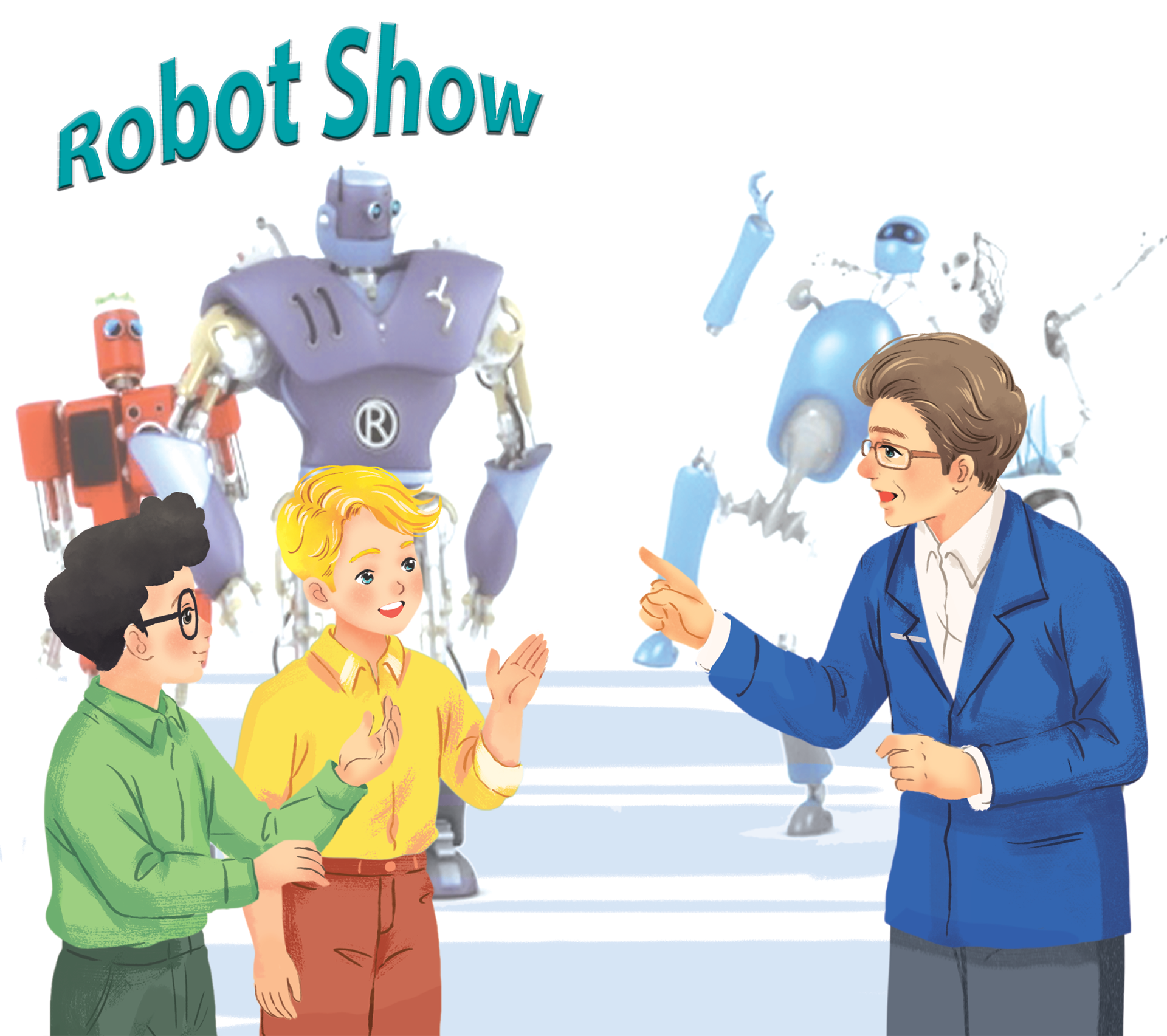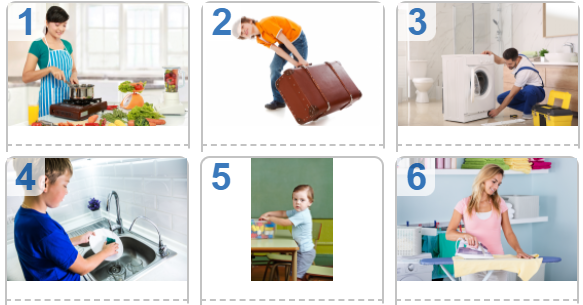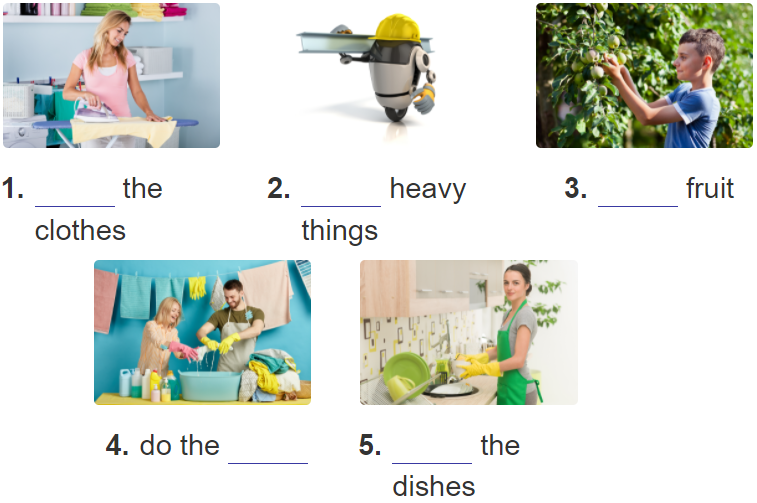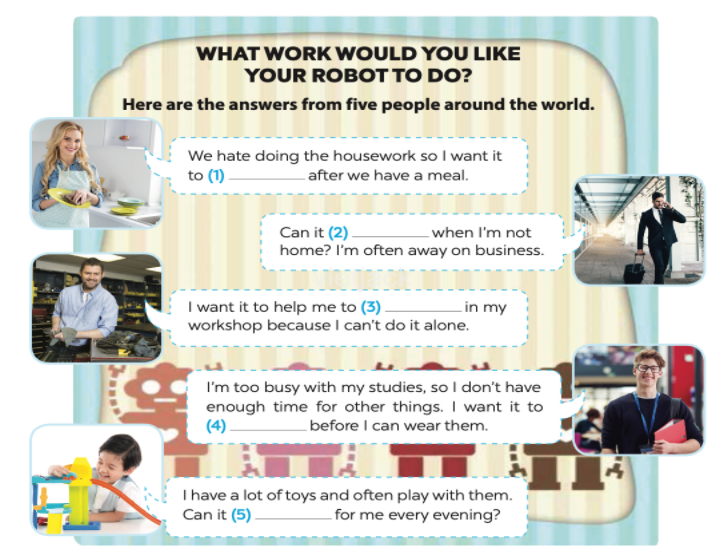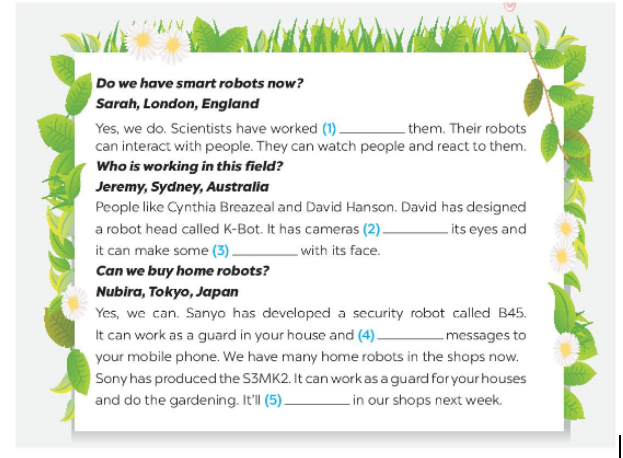Giải SGK, SBT Unit 12. Robots Global Success
Giải SGK, SBT Unit 12 Global Success
2. Read the conversation and tick (✓ ) T (True) or F (False).
(Đọc bài hội thoại và đánh dấu (✓ ) T (Đúng) hoặc F (Sai).)
|
|
T |
F |
|
1. H8 is a very useful robot. (H8 là một robot rất hữu ích.) 2. WB2 can't repair broken machines. (WB2 không thể sửa chữa máy bị hỏng.) 3. Shifa is a doctor robot. (Shifa là một robot bác sĩ.) 4. H8 is the fastest in the robot show. (H8 nhanh nhất trong triển lãm robot.) 5. Shifa is very smart. (Shifa rất thông minh.) |
|
|
3. Complete the following sentences, using the adjectives in the box.
(Hoàn thành các câu sau, sử dụng các tính từ trong hộp.)
| fast smart useful heavy strong |
1. My dad bought me a very ________ home robot last week. It helps me to do many household chores.
2. This is a very ________ car. It can travel at a speed of 300 km per hour.
3. He's very ________. He can move a big car!
4. They're making a very ________ robot. It can understand 30 languages.
5. The table is too ________ for me to move on my own.
Vocabulary
1. Match the verbs in column A to the words or phrases in column B. Then listen, check and repeat them.
(Nối các động từ trong cột A với các từ hoặc cụm từ trong cột B. Sau đó, nghe, kiểm tra và lặp lại chúng.)
|
A |
B |
|
1. understand (hiểu) 2. pick (hái) 3. do (làm) 4. water (tưới nước) 5. work (làm việc) |
a. fruit (trái cây) b. the washing (việc giặt giũ) c. our feeling (cảm xúc của chúng ta) d. as a guard (như một người bảo vệ) e. plants (cây cối) |
3. Work in pairs. Read the information about what V10, a robot, can or can't do. Ask and answer the question.
(Làm việc theo cặp. Đọc thông tin về V10, một robot, có thể hoặc không thể làm. Hỏi và trả lời câu hỏi.)
|
Skills of V10 (Các kĩ năng của V10) |
Can (có thể) |
Can’t (không thể) |
|
repair a broken machine (sửa chữa một chiếc máy bị hỏng) |
|
✓
|
|
do the washing (giặt giũ) |
✓ |
|
|
work as a guard (làm việc như một người bảo vệ) |
✓ |
|
|
read our moods (đọc tâm trạng của chúng ta) |
|
✓ |
|
water plants (tưới cây) |
✓ |
|
|
understand what we say (hiểu những gì chúng ta nói) |
|
✓ |
Example:
A: Can V10 do the washing?
(V10 có làm công việc giặt giũ được không?)
B: Yes, it can.
(Có, nó có thể.)
1. Write the superlative form of the adjectives in the table below.
(Viết dạng so sánh nhất của các tính từ trong bảng dưới đây.)
|
Adjectives |
Superlative form |
|
fast |
|
|
tall |
|
|
noisy |
|
|
nice |
|
|
hot |
|
|
light |
|
|
quite |
|
|
heavy |
|
|
large |
|
4. Work in pairs. Look at the information of the three robots: M10, H9, and A3 and talk about each of them, using superlative adjectives.
(Làm việc theo cặp. Nhìn vào thông tin của ba robot: M10, H9 và A3 và nói về từng robot, sử dụng các tính từ so sánh nhất.)
|
|
M10 |
H9 |
A3 |
|
Age (Tuổi) |
5 |
7 |
10 |
|
Weight (Cân nặng) |
20 kg |
45 kg |
50 kg |
|
Height (Chiều cao) |
80 cm |
120 cm |
150 cm |
|
Price (Giá cả) |
1.800 |
1.000 |
1.500 |
Example:
A: A3 is the tallest of the three robots.
(A3 cao nhất trong ba rô bốt.)
B: M10 is the youngest of the three robots.
(M10 là robot nhỏ tuổi nhất trong ba robot.)
4. Interview three friends about what abilities they want their robot to have. Note their answers in the table below
(Phỏng vấn ba người bạn về khả năng mà họ muốn robot của họ có. Lưu ý câu trả lời của họ trong bảng dưới đây.)
|
Friends |
Abilities he/she wants his/her robot to have |
|
|
1 |
|
|
|
2 |
|
|
|
3 |
|
|
3. Read the text again and fill the table below.
(Đọc văn bản một lần nữa và điền vào bảng dưới đây.)
|
Types of robots |
What they can do |
|
Home robots |
cook meals,... |
|
Teacher Robots |
|
|
Worker robots |
|
|
Doctor robots |
|
|
Space robots |
|
Listening
1. Listen to the conversation between Khang and Dr Adams and tick the phrases you hear.
(Hãy nghe đoạn hội thoại giữa Khang và Dr Adams và đánh dấu vào những cụm từ bạn nghe được.)
|
look after sick people (chăm sóc người ốm) |
|
|
understand what we say (hiểu những gì chúng tôi nói) |
|
|
build the very high buildings (xây dựng những tòa nhà rất cao) |
|
|
teach many subjects (dạy nhiều môn học) |
|
|
move heavy things (di chuyển những thứ nặng) |
|
2. Fill the blanks with the verbs from the box.
(Điền vào chỗ trống với các động từ trong hộp.)
| water make repair work understand |
1. Robots can ________ as guards when we're away.
2. We rarely go to restaurants because my father can ________ delicious meals at home.
3. Can you ________ my broken clock?
4. Can robots ________ our feelings?
5. My father and I ________ the plants in our garden every morning.
1. You are taking part in a robot design competition. Work in groups, decide what your robot is like and complete this table.
(Bạn đang tham gia một cuộc thi thiết kế robot. Làm việc theo nhóm, quyết định robot của bạn trông như thế nào và hoàn thành bảng này.)
|
Robot name |
|
|
Appearance (weight, height, etc...) |
|
|
Where it can work |
|
|
What it can do |
|
4. Match the sentences 1 – 5 to the phrases a – e
(Nối các câu 1 – 5 với các cụm từ a – e)
|
1. They can cook, make tea or coffee, and clean our houses |
a. doctor robots |
|
2. They can teach children instead of human teachers. |
b. space robots |
|
3. They can build buildings, bridges and roads. |
c. home robots |
|
4. They can help us to find and repair problems in our bodies. |
d. worker robots |
|
5. They can build space stations on the Moon and other planets. |
e. teacher robots |
b. Complete the conversation with these phrases. Then practise the conversation with your friends.
(Hoàn thành hội thoại với các cụm từ này. Sau đó thực hành với bạn bè của em)
|
a. I’m sorry, I don’t agree b. No, definitely not c. Do you agree with that d. What about you e. I agree with |
Duy: I don’t think we should have robots in our lives.
Nick: (1)_________. Robots are helping us a lot in industry, education, and even in our house. (2)________, Duy?
Duy: (3)________. They’re a complete waste of time and money. They’re making everybody lazy. In the future robots will take over the world. I saw a film about that once. (4)_______, Phong?
Phong: Oh, (5)________ Nick. Robots are never smarter than humans. But in the future, they will be very useful because they will do almost everything instead of us.
1. Read the conversation between an interviewer and Dr Brown, a robot expert. Tick T (True) or F (False)
(Đọc đoạn hội thoại giữa một người phỏng vấn và ông Brown, một chuyên gia robot. Tích Đúng hoặc Sai)
- Interviewer: Good morning, Dr Brown. Welcome to our programme.
- Dr Brown: Good morning.
- Interviewer: Could you tell us what robots can do now, please?
- Dr Brown: Well, they can do a lot of things in many fields now. But they can’t understand our feelings or can’t do quite a lot of complicated things.
- Interviewer: What can home robots do for us in our houses?
- Dr Brown: A lot. They can work as guards in your house and even look after your babies when you’re away.
- Interviewer: Great! Can they do more complicated things like play football or drive a car?
- Dr Brown: They can’t play football now but they can drive a car only in streets with few vehicles.
- Interviewer: Really? Can they talk to humans?
- Dr Brown: Yes. The smartest robots can understand and speak more than 30 languages.
|
T |
F |
|
|
1. Robots can understand our feelings. |
||
|
2. Home robots can do a lot of things in our houses. |
||
|
3. Robots cannot play football. |
||
|
4. Robots can drive a car in every street. |
||
|
5. Robots can talk to people. |


